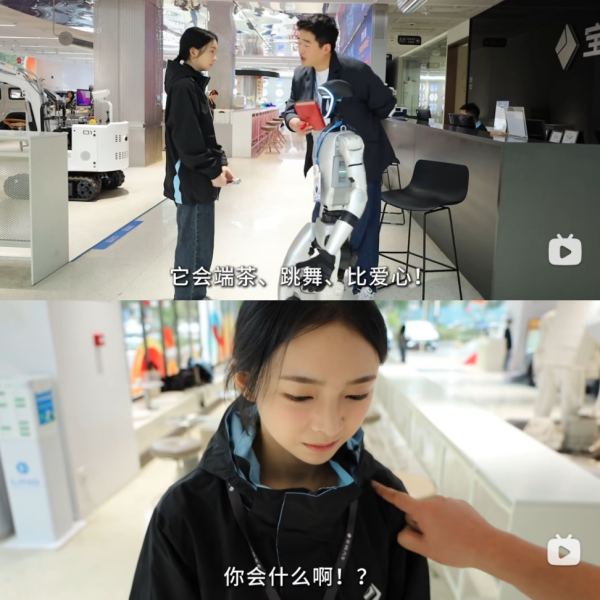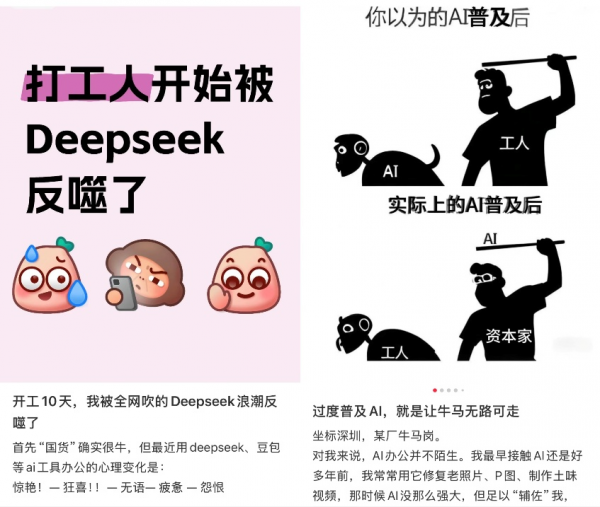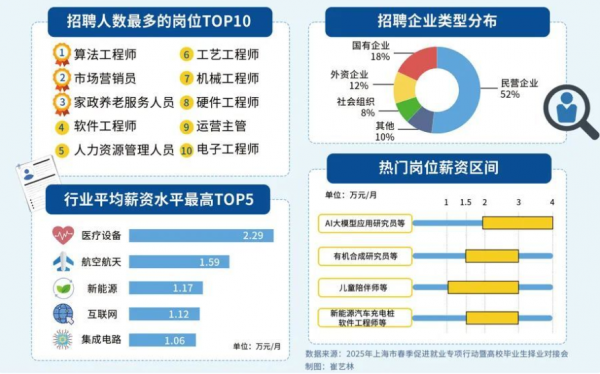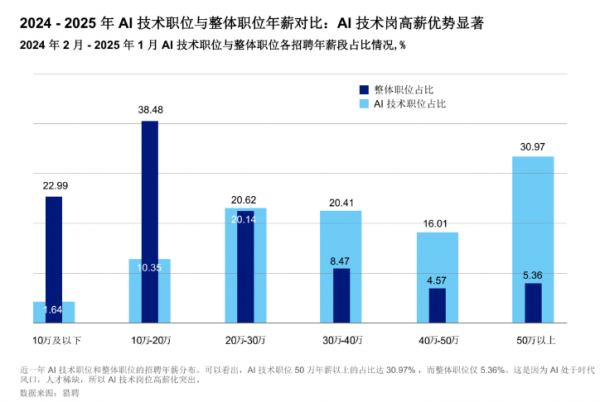"Post-00s" Rush for Spring Recruitment, Navigating the AI-Dominated Era
![]() 04/03 2025
04/03 2025
![]() 591
591

Image generated by AI
The First Wave of Workers Forced to Embrace AI Faces Challenges
Written by/Li Jinlin
Edited by/Li Ji
Typeset by/Annalee
It's the golden season of job hunting, with March and April often referred to as the prime months for graduates seeking employment. Success in this period can spare them another round of fierce competition during graduation season.
With the explosive growth of AI products like ChatGPT, DeepSeek, and Doubao, the "AI trend" has emerged as a prominent theme in this year's spring recruitment. According to the "2025 Spring Recruitment Market Industry Weekly Report (First Issue)," the number of job seekers in the AI industry increased by 33.4% year-on-year during the first week of spring recruitment, ranking first among all industries. The job-seeking growth rate for AI engineers reached 69.6%, topping all professions.
Moreover, many companies offer lucrative salaries to AI talents. For instance, algorithm engineers have an average monthly recruitment salary of 23,000 yuan, while AI lecturers command an average monthly salary of 16,000 yuan. High salaries and scarcity have become synonymous with AI-related jobs.
However, there's a flipside to this coin: the fear of being overtaken by AI. As industries view AI as the key to the new era and non-technical corporate leaders blindly demand its integration, this generation of workers is already feeling overwhelmed by AI, even before being replaced by it.
Not Afraid of Replacement, but Overwhelmed by AI
A saying often used to describe the impact of the AI industry on society goes: in the future world, there will be only two types of people—those who can use AI and those who cannot.
Although such a future has yet to arrive, since DeepSeek sparked another wave of AI innovation, the situation for some workers has begun to change subtly.
Ren Ying, a senior journalism student at a university in Sichuan, recently applied for an online job titled AI Content Copywriter. After passing the initial interview, the employer sent Ren Ying a detailed job description that left her stunned; it was essentially recruiting an entire team.

Jokes from "UP master" Xiangyanbao
Ren Ying received a job description encompassing five main tasks, each with specific requirements akin to those of independent positions.
The first task involved AI content planning and topic selection. Since the employer was in the jewelry industry with objective customer acquisition needs, Ren Ying was required to use AI tools to plan graphic content and short video topics that met marketing requirements.
Planning alone wasn't enough. The second task demanded copywriting optimization and graphic creation. The employer's leadership understood that AI-generated copywriting couldn't be used directly, so Ren Ying had to optimize it with the core purpose of promoting business inquiries.
"It's hard to say. Relying solely on AI content and a fresh college graduate to secure orders—is that overestimating AI's capabilities?" wondered Ren Ying.
After completing the copywriting, videos also needed to be produced. Ren Ying's third task was AI-generated video content planning and production, using AI tools to create short video content, including AI voiceover videos, AI image-generated videos, animated content, etc. She was also responsible for optimizing the copywriting, voiceovers, subtitles, and editing schemes of AI-generated videos to ensure high-quality content suitable for business dissemination.
With copywriting and videos in place, community operations were also necessary, requiring regular output of AI-generated marketing copywriting and videos according to private domain community strategies to create standardized AI-generated content services.
Finally, the employer expected Ren Ying to regularly analyze and optimize data. The ultimate responsibility for the click-through rate, interaction rate, and lead conversion rate of AI-generated content lay not with AI but with Ren Ying.
"When I first saw the job description, I was shocked. This should be the workload of at least three positions: copywriting, video, and operations. How can one person handle it all with the help of AI tools?" Ren Ying not only didn't understand the employer's recruitment requirements but also believed that the quality of content produced this way would suffer significantly.
However, the employer held a contrasting view. They informed Ren Ying that someone had held this position for six months before it became vacant due to personal reasons. This meant that the feasibility of such work content settings had already been proven in practice, both from talent recruitment and corporate operation perspectives.
Ren Ying actively declined the offer, not only because she couldn't accept the workload but also because the employer could only offer a salary of 5,000 yuan per month for a graduating student.

Netizens Complain About AI Tools
In fact, the fear of being overwhelmed by AI is not unique to graduating students like Ren Ying. Rather, with the advent of AI, "workers" across industries are all feeling the pinch.
Netizen "Fufu" posted on Xiaohongshu: "You think the popularization of AI is for workers to command AI, but in reality, it's for capitalists to command workers even more absurdly. Since the advent of AI tools, my workload has increased severalfold because leaders believe that animations that used to take two weeks can now be done in just three days with AI assistance."
However, AI animations completed in just three days are inferior to those produced manually, resulting in doubled workloads and a never-ending game with AI.
"Many self-media outlets overhype current AI tools, showcasing various AI works that subvert tradition. But in reality, these so-called convenient and efficient works are the result of numerous 'draws.' Not everything desired can be directly generated by AI tools," Zhao Xin, who works for a startup company, told Xin Kedu. "Self-media outlets exaggerate to attract attention and pursue traffic, but some small business owners develop cognitive biases, leading to increased workloads for those doing the actual work."
For contemporary workers, the greatest fear now is not being replaced by AI but being overwhelmed by it. In the past, recruitment emphasized specialized expertise, but with AI tools, some employers have become demanding in multiple aspects.
High Salaries for AI Talents: A Celebration for the Minority
While some employers have embraced the AI wave excessively, we cannot deny that AI is rapidly transforming traditional work patterns, and new AI-related jobs are emerging rapidly. For example, after DeepSeek became an overnight sensation, some individuals used it to sell courses, fortune-tell, write novels, and amassed fortunes. Large companies, too, have launched competitions for AI talents, offering attractive conditions like annual salaries in the tens of millions.
On December 30 last year, on the eve of DeepSeek's popularity, Luo Fuli, known as the "post-95s AI genius girl," was rumored to have been recruited by Lei Jun with an annual salary of ten million yuan to head Xiaomi's AI laboratory's large model team. Although this rumor didn't pan out, the race for top AI engineers among large companies was indeed heating up.
According to the "2025 AI Technology Talent Supply and Demand Insight Report" by Liepin Big Data Research Institute, among AI technology positions, those with an annual salary of over 500,000 yuan account for the highest proportion, at 30.97%.

Zhang Yi, CEO of iiMedia Consulting, once told the media: "As the main direction of technological innovation in the next decade, AI will be a crucial race for future technology and internet giants to maintain their glory. From this perspective, the future layout of AI talents is key to completing product innovation and winning the market. Against this backdrop, on one hand, large companies are also cultivating AI talents internally, but most are stuck in the past internet mindset, products, and models. It's difficult for them to abandon their original thinking, so they have to seek talent from outside, which is understandable."
However, this remains a celebration for the minority.
Currently, when people discuss AI, many workers often feel uneasy, as if AI has become a "Sword of Damocles" hanging over their heads. While a calm analysis at this stage suggests that AI shouldn't be viewed as a nightmare for workers—just as when the automobile was invented, rickshaw pullers lost their jobs, but the rise of the automotive industry boosted economic and social development, and industrial upgrading created new employment opportunities—the anxiety about AI currently harbored by workers is objectively present.
AI talents at the top of the pyramid are highly sought after by companies, while ordinary individuals constantly worry about being eliminated for failing to keep pace with the times. They observe the continuous emergence of automation equipment and intelligent software around them, and their unease grows daily.

Image source: Tuoduan
This anxiety, like fertile soil, nurtures the relevant education industry. From entry-level courses for 9.9 yuan to special training camps and private board meetings costing tens of thousands of yuan, they continue to attract batches of workers. However, these theoretical sermons often lack substance.
We cannot deny that new technological trends will inevitably impact traditional jobs, but we must also acknowledge that more and higher-quality jobs will be created. Ding Guanghong, a professor at Fudan University and vice chair of the Shanghai China Vocational Education Society, believes that the key lies in identifying, exploring, and adapting to new spaces. From a university education perspective, it's necessary to stay current and reform professional settings and course content in tandem with AI technology's development and evolution. From an individual standpoint, it's crucial to strengthen lifelong learning abilities, not be content with singular professional knowledge education, and strive to become interdisciplinary talents. It's essential to recognize that knowledge growth is no longer a linear accumulation but an exponential explosion. Relying solely on university knowledge to handle everything won't suffice, at least for the foreseeable future.
Looking at the broader job market, it's unrealistic to expect most people to become elite talents hired by companies at high salaries. However, a balanced coexistence model to alleviate anxiety involves reasonably utilizing AI tools to enhance basic wage efficiency and then adding a "human touch" to the work content on this foundation.








